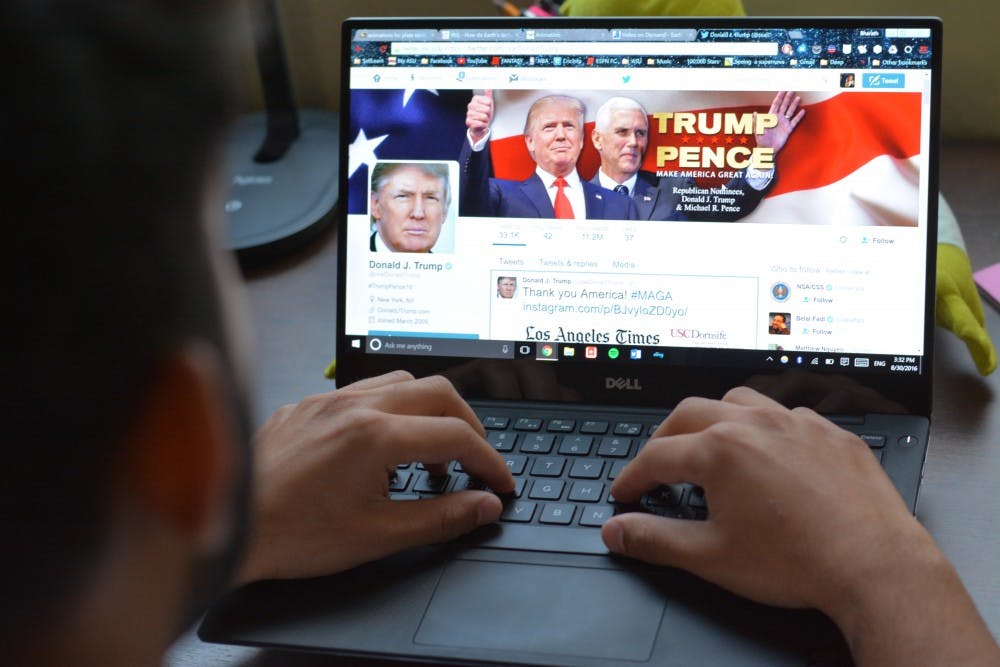In 2012, Nate Silver correctly predicted the winner of all 50 states in the U.S presidential election. Right now on Silver's website, FiveThirtyEight.com, there is map of all fifty states and Silver's prediction on each one. Although most political pundits would call specific attention to the battleground states like Ohio, Florida, Pennsylvania and Arizona, there is one state missing from Silver's map: Twitter.
Obviously, Twitter is not a state, but so much politicking happens through retweets and favorites these days that it deserves serious consideration. With about sixty days until Election Day 2016, we are in the thick of the U.S. presidential election. As the media will remind you, there has never been a presidential election quite like this one.
As a college student voting for the first time, I could not be more disappointed. In many ways, it seems like a stalemate with the two major parties seeming as bad as each other and third-party candidates being as irrelevant as ever.
Read more: Join or die: How the youth will change the Republican party
This particular election is unique, not just because of the petty politics and avoidance of issues by both major candidates, the xenophobic controversy and the increasing polarization of America, but because of the technology/platforms utilized.
Never has an election been so focused on an online medium like Twitter, where you find both Hillary Clinton and Donald Trump trading blows and expelling redirect. What is incredibly counterintuitive is news doing stories about social media instead of how it should be, the other way round.
Delete your account. https://t.co/Oa92sncRQY
— Hillary Clinton (@HillaryClinton) June 9, 2016
Mr. Khan, who does not know me, viciously attacked me from the stage of the DNC and is now all over T.V. doing the same - Nice!
— Donald J. Trump (@realDonaldTrump) August 1, 2016
Online media professor Leslie Jean-Thornton of the Walter Cronkite School of Journalism and Mass Communication was unavailable to discuss the topic in person, but wrote in an email, "Part of the goal of using Twitter is to spark engagement," she wrote. "One might count followers, retweets and replies, for example, to get some idea, but all of these numbers can be artificially manipulated. Donald Trump's tweets, for example, are laden with the type of words and sentiments that attract bots and that in turn increases the numbers."
As I found after a quick Google search, Donald Trump's Twitter campaign has gained so much notoriety that websites like trumpgenerator.com are able to customize offensive Trump-esque tweets and post them on a user's timeline.
"That one candidate is known as 'Twitterfingers' speaks volumes about the platform's place in the proceedings," Jean-Thornton wrote. "Never before have we seen a public display such as that between Donald Trump and Mexican President Enrique Peña Nieto."
Now more than ever, public opinion is crucially important as the latest poll have Clinton up in those aforementioned battleground states, but she is just a few viral tweets away from drawing back even with Trump. The thing about Twitter is that it's very public. Wins and losses are evident even to those without an account. The election has devolved into a popularity contest.
With Twitter serving as the primary mouthpiece for the campaigns of Clinton and Trump, as well as third-party candidates like Jill Stein and Gary Johnson, we as voters and media-consumers are constantly bombarded with campaign coverage around the clock. This is more than annoying; it's tiresome.
What's worse is that it's disingenuous.
"Not all tweets are written by the candidate his- or herself, there can be an impression of direct and 24/7 access," Jean-Thornton wrote. "In fact, that speaks to an ironic lack of transparency as the Twitter platform was built on assumptions of speed and openness."
I know personally that I am ready for the election coverage to be over and the circus to go home; there are other stories out there that have been ignored that I would rather read.
Reach the columnist at akhawaj1@asu.edu or follow @_amirk15 on Twitter.
Editor’s note: The opinions presented in this column are the author’s and do not imply any endorsement from The State Press or its editors.
Want to join the conversation? Send an email to opiniondesk.statepress@gmail.com. Keep letters under 300 words and be sure to include your university affiliation. Anonymity will not be granted.
Like The State Press on Facebook and follow @statepress on Twitter.




